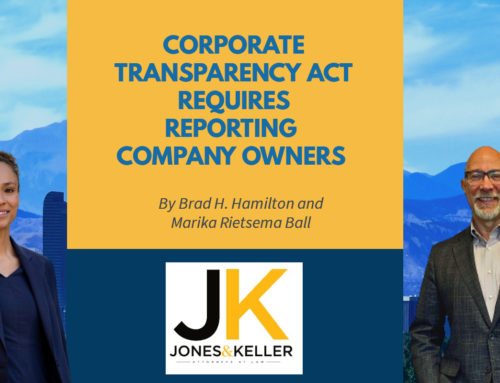Breach of Contract in the Time of Corona
April 22, 2020 by Brad H. Hamilton
Business in the United States runs on contracts; more precisely, it runs on transactions, but every transaction is a contract. Some contracts are detailed written documents. Some are less comprehensive, like purchase order forms and invoices. Others are based on a handshake (or used to be, when it was safe to shake hands). The effect of the COVID-19 pandemic on business worldwide is enormous, tragic, and unprecedented.
Job losses as of April 16, 2020 by state range from 18% in Michigan, Rhode Island, Pennsylvania, Nevada, and Hawaii to 4% in North Dakota.[1] Between March 14, 2020 and April 4, 2020 more than 15,265,000 Americans filed for unemployment insurance.[2]
Between March 16, 2020 and April 16, 2020 an astounding number of small businesses in the U.S. closed their doors, including 90% of health and beauty businesses, 60% of bars and lounges, 25% of hotels and motels, 70% of arts and entertainment, and 40% of restaurants and sports and entertainment venues.[3] And this tragedy has not hit only small businesses. Apple, Nike, Macy’s, Kohls, Nordstrom, and most other large retailers are also closed, along with the malls that house them.
The costs of operating a business can generally be divided into fixed costs and variable costs. Variable costs increase with greater traffic and usage, such as credit card transaction fees, inventory, and in some cases utilities like power and water. If the business closes, variable costs are reduced and may be manageable for a limited time. Fixed costs however, like rent, mortgage, and loan payments stay the same. So what does a business owner do when the bank or landlord or other contract party wants to be paid, and there is no revenue?
There are several concepts of contract law that may provide the non-paying party relief from default and breach of contract claims or termination (at least temporarily), when the cause is government ordered closure due to a pandemic.
FORCE MAJEURE
force majeure (fors ma-zhər) [Law French “a superior force”] (1883) An event or effect that can be neither anticipated nor controlled; esp., an unexpected event that prevents someone from doing or completing something that he or she had agreed or officially planned to do. • The term includes both acts of nature (e.g., floods and hurricanes) and acts of people (e.g., riots, strikes, and wars). — Also termed force majesture; vis major; superior force. Cf. ACT OF GOD; VIS MAJOR.[4]
Force majeure is a contract term. If you don’t have a force majeure provision (sometimes called a ‘delay’ provision) in your contract, you can skip this section. You can usually find it by searching for ‘force majeure,’ ‘act of God,’ ‘riot,’ or ‘labor disputes,’ all terms that usually won’t appear anyplace else in a contract.
Since a force majeure clause excuses one or more contract party’s performance, at least temporarily, it is strictly interpreted and applied. To invoke force majeure, the event must qualify under the language of the contract; is the event giving rise to nonperformance specifically listed as a qualifying force majeure in the contract?[5] In addition, the event must be beyond the control of the parties, not anticipated, foreseeable, or expected, and the event must be unavoidable. If the event could have reasonably been anticipated and avoided, you may not invoke force majeure.[6]
Here is a sample of a thorough, comprehensive force majeure clause:
“Force Majeure” shall mean causes beyond the reasonable control of a party, including without limitation acts of God; acts of a public enemy; war; rebellion; insurrection; riot; epidemic; quarantine restrictions; acts of any governmental authority or any political subdivision or any department or regulatory agency thereof or entity created thereby; orders of any court or arbitral body; acts of any person or persons engaged in subversive activity or sabotage; fires, floods, explosions, storms, earthquakes, or other catastrophes; strikes or labor disputes; embargoes; unavoidable delays or inability to obtain equipment, labor, fuel, steam, water, electricity or materials or anything else necessary to operate [party’s] manufacturing and supply facilities. If either party hereto is prevented or delayed in the performance of any material term, condition or obligation under this Agreement (other than the payment of money) due to Force Majeure, such party shall give prompt notice to the other of the commencement, expected duration and termination of any such Force Majeure contingency. Such party’s nonperformance shall be excused and the time for performance extended for the period of delay or inability to perform due to such Force Majeure.
It is difficult to imagine a scenario where the language above would not be interpreted as a force majeure event due to COVID-19 ordered closings and stay-at-home orders, unless the contract parties were virologists monitoring the novel corona virus outbreak in China when they entered the contract; in that unique situation, the pandemic would have been foreseeable by the parties.
On the other end of the spectrum, the construction-related contract forms provided by the American Institute of Architects (AIA) have a very broad “delay” provision, that provides relief only to the Contractor, and not to the Owner. The standard AIA delay provision is:
If the Contractor is delayed at any time in the commencement or progress of the Work by (1) changes ordered in the Work; (2) by labor disputes, fire, unusual delay in deliveries, abnormal adverse weather conditions not reasonably anticipatable, unavoidable casualties, or any causes beyond the Contractor’s control; or (3) by other causes that the Contractor asserts, and the Architect determines, justify delay, then the Contract Time shall be extended for such reasonable time as the Architect may determine, subject to the provisions of Article 21 (dispute resolution).
Under this provision, the Contractor gets to extend its performance schedule because of a delay beyond its control, which if often important for the Contractor to avoid liquidated “delay damages” for failing to keep schedule. Under the AIA standard forms there is no relief for the Owner, but the forms also typically give the Owner the right to suspend the work, change the schedule, or terminate the contract, when Owner wants to.
If you or your contract counter party is in default or soon will be, due to the pandemic, your first step is to check the applicable contract for a force majeure provision. Force majeure provisions usually require the affected party to give notice, and to take reasonable steps to mitigate the effect of the event and resume its obligations as soon as reasonably practicable. Strict compliance with these requirements is usually necessary to invoke force majeure relief.
IMPOSSIBILITY OR IMPRACTICABILITY
If your contract does not have a force majeure clause, you may nevertheless be able to utilize the common law doctrines of impossibility and impracticability. The common law doctrine of impossibility “allows a party to suspend or avoid performance when a supervening event beyond its control makes performance of the contract no longer capable of being performed.”[7]
“Impracticability of performance or frustration of purpose that is only temporary suspends the obligor’s duty to perform while the impracticability or frustration exists but does not discharge his duty or prevent it from arising unless his performance after the cessation of the impracticability or frustration would be materially more burdensome than had there been no impracticability or frustration.”[8]
Impracticability is widely considered to be a slightly lower standard, and therefore easier to meet, than impossibility. States are not uniform in their application of these principals; some states recognize impracticability as grounds for relief, while other states like New York require the higher impossibility standard, unless the contract is for the sale of goods, in which case the doctrine of commercial impracticability is codified in the Uniform Commercial Code § 2-615 – Excuse by Failure of Presupposed Conditions.
Colorado courts recognize the doctrine of impracticability, holding that “Impracticability rather than absolute impossibility is enough to establish ‘impossibility of performance.’”[9]
To prevail on a defense of commercial impracticability, a party must show (1) an unforeseeable supervening event made performance impracticable, (2) the nonoccurrence of the event was a basic assumption in entering the contract; (3) the event was not the party’s fault; and (4) the party did not assume the risk of the event.[10]
Like force majeure, performance will not be excused if the event preventing performance was expected or was a foreseeable risk at the time of the contract’s execution.[11]
FRUSTRATION OF PURPOSE
Frustration of purpose is similar to impracticability and impossibility but focuses on whether the event has destroyed the purpose of the contract, rather than whether it has made a party’s contractual performance impossible. If the unforeseeable event has significantly altered the circumstances of a contract such that performance would no longer fulfill any aspect of its original purpose, then the contract has been “frustrated.” However, frustration as a defense to breach of contract is asserted less often than the principles discussed above, because courts interpret a party’s contract “purpose” broadly, and the “frustration” must be total; not merely inconvenient, difficult, or unprofitable.[12]
CONCLUSION
Most of our clients are negotiating revised deal terms to address this pandemic and resulting economic and financial disaster. Landlords are reducing or deferring rent, suppliers are offering payment delays. Banks are waiving defaults and changing payment requirements and loan covenants. People recognize that a cataclysm of this magnitude affects everyone, and that attempting to hold only party to a contract completely responsible for their obligations, without sharing the pain, is unfair and counterproductive. While litigation and bankruptcies will be part of the fallout, we believe most defaults will be resolved through revised contracts. However, it is important for the parties negotiating contract changes to understand the legal principles that underlie the application of the contract, and which party may have the leverage in those negotiations.
[1] U.S. Dept. Labor
[2] Id.
[3] Womply Report: How many local businesses have had to close due to COVID-19? www.womply.com
[4] Black’s Law Dictionary (11th ed. 2019)
[5] 30 WILLISTON ON CONTRACTS § 77:31 (4th Ed.).
[6] Pawnee Land & Canal Co. v. Jenkins, 1 Colo. App. 425, 29 P. 381 (1892).
[7] 17A Am. Jur. 2d Contracts § 655 (2010).
[8] Restatement (Second) of Contracts, § 269 (1981).
[9] City of Littleton v. Employers Fire Ins. Co., 453 P.2d 810; 169 Colo. 104 (1969).
[10] L.W. Matteson, Inc. v. U.S., 61 Fed. Cl. 296 (2004).
[11] Korea Life Ins. Co., Ltd. v. Morgan Guar. Trust Co. of N.Y., 269 F. Supp. 2d 424, 447 (S.D.N.Y. 2003); Davis v. Dawson, Inc., 15 F. Supp. 2d 64, 115 (D. Mass. 1998).
[12] FARNSWORTH ON CONTRACTS § 9.09 (4th ed 2019).




